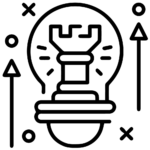
Education as a changing experience
I view education as a living, collaborative, and transformative experience. In class, teaching and learning become a dynamic, two-way exchange of knowledge perspectives and ideas. For me, education is about cultivating curiosity, fostering critical thinking, and empowering individuals to apply their knowledge in meaningful and innovative ways.
As an Assistant Professor, I teach “Business Administration and Organization” at the University of Padova, Italy. In this role, I support students in understanding the fundamentals of economics and business strategy, combining theoretical frameworks with real-world applications to make learning relevant and impactful.
Additionally, I enjoy conducting specialized workshops that dive into emerging and innovative themes, particularly at the intersection of entrepreneurship and artificial intelligence. These sessions are designed to challenge conventional thinking and inspire participants to explore the transformative potential of technology in business.
I believe that education should adapt to the rapidly changing world, fostering an environment where students and educators alike grow together. Through classroom teaching and workshops, I aim to encourage a passion for lifelong learning and provide individuals with the skills they need to pursue and achieve their aspirations.
Business Administration and Organization
University of Padova, Italy
Teacher in charge: Francesco Ferrati
This course is designed to provide engineering students with fundamental knowledge and skills in economics and business. After completing the course, students will appreciate the key principles of economics and be able to identify the operations of the key business functions. They will recognize the characteristics of different organizational structures and learn the basic principles of defining a business strategy. Students will also analyze a company’s cost structure and define a pricing strategy. In addition, they will be able to read and interpret a company’s financial statements according to current regulations and perform financial statement analysis.
The full course is organized into 15 modules: (1) Elements of economics, (2) Entrepreneurship and companies, (3) Innovation and technology (4) Intellectual property, (5) Production systems, (6) Logistics; (7) Market, (8) Marketing, (9) Business models, (10) Organizational structures, (11) Corporate culture, (12) Costs, revenues and break-even points, (13) Financial statement: structure, (14) Financial statement: transactions, (15) Financial statement: financial ratios.
Entrepreneurship and Startup
University of Padova, Italy
Teachers in charge: Moreno Muffatto, Francesco Ferrati
The goal of this course is to enhance the entrepreneurial knowledge and capabilities of academic researchers, enabling them to effectively transform their scientific discoveries and research outcomes into successful entrepreneurial ventures. Targeted primarily at PhD students, Post-Docs, and researchers of the University of Padova, the course offers a comprehensive curriculum that includes key aspects of entrepreneurship such as business model development, market analysis, intellectual property management, and startup financing.
By bridging the gap between research and entrepreneurship, the course aims to foster a culture of innovation within the academic community.
Workshops
Building on my research activity, I enjoy conducting topic-specific workshops. Sessions are designed to actively engage all participants through learning-by-doing activities.The workshops are intended for different types of audiences, both scholars and practitioners.
Currently, the workshops I am working on mainly involve emerging applications of Generative AI, including:

GenAI for academic research

GenAI for innovation

GenAI for startups generation

GenAI for decision-making

GenAI for practice


